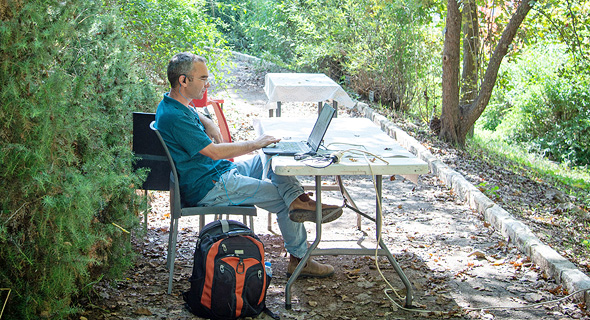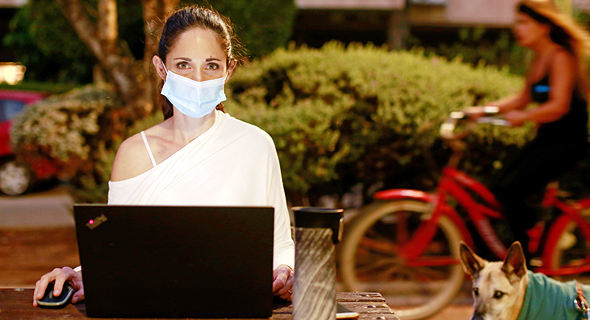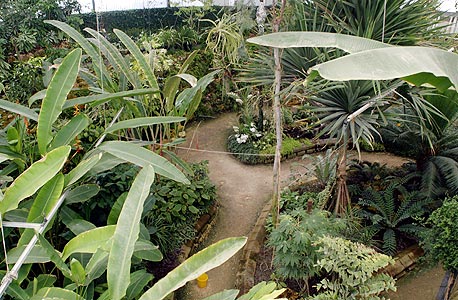Who needs an office? Working outside is Israel’s hottest fall trend
With people weary from sitting at home, public gardens, sidewalks, and parks give 'open space' a new meaning
“Nature is awakening,” was one of the leading slogans of the first coronavirus (Covid-19) lockdown: animals suddenly enjoyed the absence of humans who had been confined to their homes. Now, during the second wave, nature is awakening again this time with the emergence of the common laptop. Just like the goat, pig, or jackal, the laptop carriers have come out into the open due to changes to their natural living conditions. With offices, cafes, and libraries closed, they suddenly find themselves out in the open air.
Eldad and Esty Yakobi from Tel Aviv, who live adjacent to the Yarkon Park, have converted the public benches - near a stream and passing ducks - into their new office. He is a programmer who develops fintech tools, she works in e-commerce. They have three children, two Mac laptops, and one stroller containing their youngest son, Ilai, who was born in March. “I worked in an office in the Azrieli towers on the 22nd floor with a view of the ocean and city, and had certain energies there,” Eldad says. “But outside there’s something about the view that makes you feel relaxed. When you’re here with the birds, you feel that you’re part of nature. You’re more relaxed, and there are fewer things that distract you.” Even the neighbor on the next bench over, who’s immersed in Zoom sessions, doesn’t bother him. “It inspires me to work like this,” Esther adds. “You suddenly feel as if your mind works differently, you recall things, and say to yourself ‘wow, I had completely forgotten about that.’”

For them, this arrangement isn’t temporary. “We’ll continue to come here, even after the coronavirus (Covid-19) is over,” Eldad said. “I think that companies will look at this differently. I’m hearing from friends that there are plenty of others who are doing this too, and I know of a company that takes its employees to work at the beach. If I was a team leader, I’d also do that once in a while, or have a work day at a park or someplace else.”
“It really is inspiring,” says another person on his laptop who we come across in the Jerusalem Botanical Gardens, where he has set up an organized workplace, near a pond filled with water lilies, surrounded by plants and small signs that list each species. He works for a startup that develops tools for AI in agtech, so his environment provides him with more inspiration than others. “This is my first time in the garden, but I’ll continue to come here. Not every day, but definitely to break up my routine. There is a lovely view, it’s very refreshing,” he said.
The people aspect is missing
Not everyone needs a stream or a pond, and sometimes sitting on a bench or a sidewalk in the city’s center, or even in the country’s best-known roundabout, Dizengoff Square, can be refreshing. Over the past few weeks, people with laptops have popped up everywhere, working outside as the weather improves, and after six months of sitting indoors, that took their toll on people. In certain areas, one can sit on a chair, and balance a laptop on their knees with a wireless connection to WiFi from their phones, while in certain spots there is outdoor WiFi, electrical sockets, and work tables. Either way, going outdoors is part of the new normal since the coronavirus (Covid-19) pandemic entered our lives. Work routines have completely changed, and it isn't necessary to sit in an office anymore. After much frustration, people have created for themselves a comfortable work zone, whether alone or surrounded by the sky, trees, birds, passing pedestrians, and more. Some think that the bustle of traffic, the sound of cars and buses actually helps them concentrate.
“I like seeing people. Even after the pandemic is over I prefer to work in a library, and not alone in an office. I hope that universities will consider opening centers like that,” Dr. Oded Steinberg a historian at the Hebrew University of Jerusalem said. In the past, he has spent a lot of time working from cafes and now works at least once a week in the Jerusalem Botanical Gardens, and managed to bring his brother and a few friends along. “At home, for me at least, it’s impossible to work. I feel as if the walls are closing in on me, and if you don’t feel like working from home, you’ll always find an excuse, you’ll suddenly get up and start sweeping the floor. Working with people is important. Monks from the Middle Ages didn’t simply write together for the fun of it. I’m typically very immersed in my work, but I love those breaks where you socialize a bit. I have really interesting conversations with strangers. That’s what’s happening now, people feel a need to break free,” he said.

At the botanical gardens in Givat Ram, many people work either at tables or in cafes. There’s free WiFi, tables, chairs, and electrical outlets. The garden is near oak trees that provide comfortable shade. Occasionally it’s cold, but one of the typical occupants, a translator, explains how she enjoyed working out in the open, even when she was in Switzerland, in the cold. “I just bought more blankets,” she said. The Communal and Sustainability Director of the gardens, Yotam Reshef, initiated the construction of a work zone for people during the first lockdown. He notes that one company has paid for a full-time membership for its employees so that they may work outside (entry fees without membership cost NIS 35, or $10.50 for an adult), and organized a pilates class for employees in the gardens before work. Soon, the rainy season will arrive and the gardens will close, “we’ll return in the spring with a better platform and discounts to encourage more people to come,” he said.
Companies that encourage their employees to work outdoors are well-known, especially in the Gazelle Valley Park in Jerusalem. There isn’t any infrastructure that allows people to connect to the internet or to electricity, but there are places to sit. “Managers from different places, even from the Israel Police, come here with their employees to hold meetings, and sometimes to eat breakfast,” Yael Hammermann-Solar, Manager of the Park from the Israeli Nature and Parks Authority said. “You don’t have to plan anything, you can just come here, entry is free.” She added that the number of visitors to the park has increased from 100-150 visitors per day before the pandemic, to 350-400 during the first lockdown. The authority has also seen an increase in visitors to other parks, mainly in the Ein Hemed National Park near Abu Ghosh, Tel Afek National Park near Petah Tikva, and Beit She’arim and Afek Parks in the northern part of the country. “We’ve seen companies hold meetings with their employees at these sites,” Orit Sheinfeld, a marketing manager for the authority says. Some of the sites have WiFi, but even the authorities admit that the infrastructure needs improvement, adding work areas, and maybe even cafes.
To escape home or not?
Tel Aviv certainly isn’t lacking in cafes, which are located at every corner, but they are all currently closed due to the lockdown. From the beginning of history, people have worked outdoors, and working within walls is relatively new, a small comma in the overall history of time. Due to the pandemic, people are suddenly recalling this fact, and there is a race to return to open spaces, to safe spots where one can soak up vitamin D, the best medicine to protect oneself from the pandemic.
Even if it’s only in a small public garden or on a bench on a sidewalk, Tel Aviv’s open spaces are designed for people with laptops. On Ben-Gurion Boulevard Moran Arad, 39, sits next to an old dog. Her apartment is next door, she has two daughters and runs a physical therapy clinic, but now she’s spending time dealing with admin and emails, so she takes her laptop to the sidewalk and works. “Now I’m sitting, but sometimes I lie here on the grass. I need to take care of my body, and I can’t sit the whole day. You need to change positions twice a day,” she says and provides an example, as she gets up to do basic exercises to refresh the body after prolonged sitting, whether at home or outdoors. At the HaBima Square, one can also find several people, and Dizengoff Square is filled with people all day long.
One can find places more suitable for work with tables and electrical outlets on Rothschild Boulevard, a square that is adjacent to the Neve Tzedek neighborhood, and at the Histadrut Garden on Arlozorov Street, which only opened at the end of the month and draws several people. Two construction sites are adjacent and are noisy and spew dust, but closer to the lawn, there are comfortable chairs and a cafe, where one can work quietly.
Lior Paz, 26, is a programmer at a leading international tech company and feels that finally, he has found his place. “In March, they closed our offices and since then I’ve been working from home. In the beginning, I tried to rent a shared office space, but it was too expensive. Since then, I’ve been alternating between gardens and coffee stands that are still open. I just need to break my routine, I’m unable to sit in boxer shorts all day,” he said. That’s another thing that the pandemic has done: it broadened the community of laptop wanderers, whether they’re freelancers, creators, tech workers, or any other free-roaming job, whose been left without an office. “Programmers generally don’t work in cafes, it’s less comfortable since we need to work in front of two computer screens, like the setup I have at home,” Paz said. “It’s also not so comfortable here, I wish I could bring my two screens with me, so that’s why I don’t do this every day. I’m here since at home I have a couch, a television, and other temptations that allow me to avoid working. Here there isn’t any of that, there’s nowhere to run.” In a way, that’s also a return to work itself.

Compared to the busy vibe of the Histadrut Gardens, on Rothschild Boulevard, where restaurants are interspersed throughout, and a sidewalk filled with youngsters on skateboards who enjoy the wide-open space, there is an atmosphere of jubilation. Yaniv Magen loves it so much that he comes here all the way from Givatayim. He works at a company that provides software solutions to big companies, and his ideal routine is to “start my day here, spend five or six hours, and then continue my work from home. I have three kids, so when I wake up I have two jobs, my home-job, and my work-job. I’m tired of hearing ‘dad, the internet isn’t working,’ or ‘dad, what’s for lunch?.’’ I prefer the distractions here, having people all around me, and I talk to passersby.”
“It could be that your work output decreases here, it could be that you get distracted,” Adar Tzahor, 26, a student who also works at Tel Aviv University and who has created a small office of sorts with a friend, said. “But in my eyes, it’s more efficient in the long term. The concept of working outside the office should stick around even after the pandemic. It’s a great solution, and is better than sitting all day in an office, from morning until night.”



